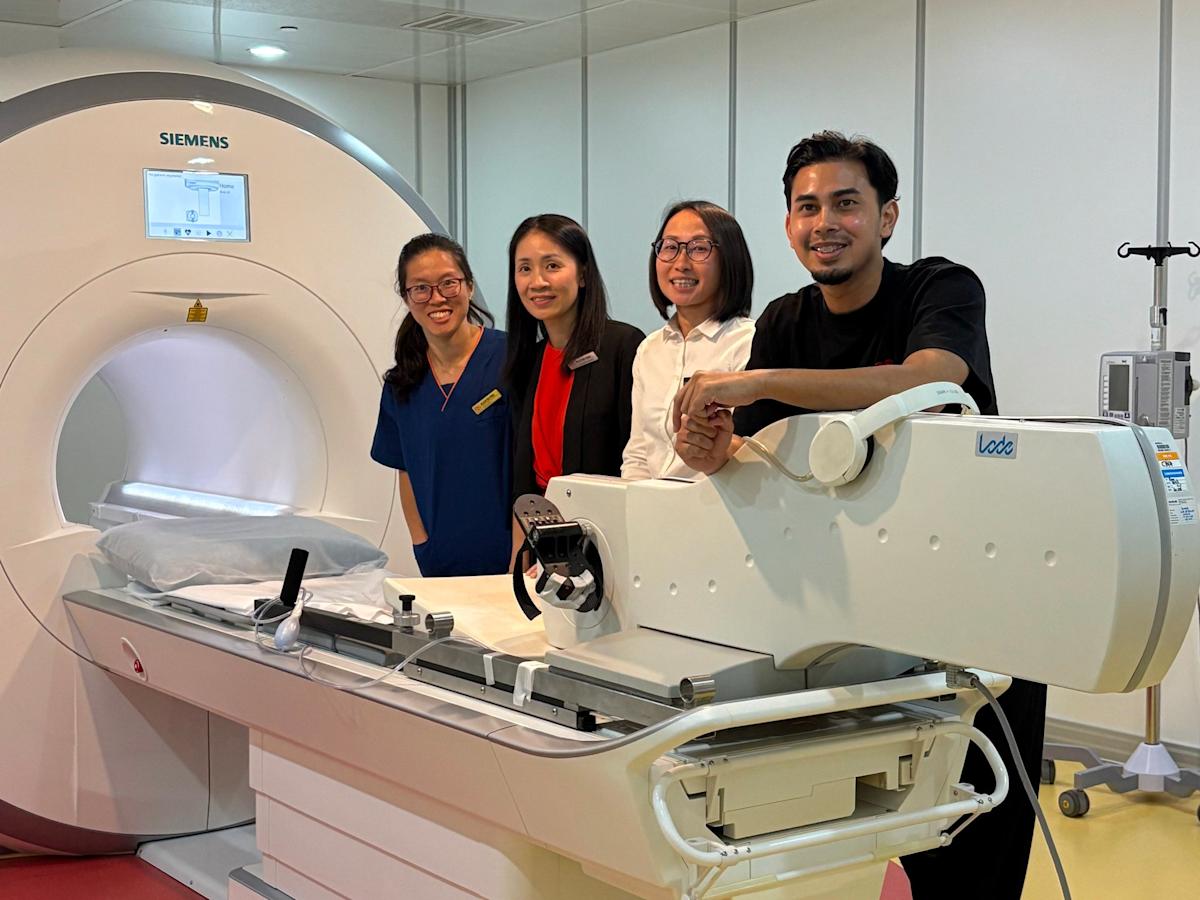SINGAPORE – Active individuals will be able to get a faster diagnosis of potentially life-threatening or serious heart conditions with an imaging test introduced by the National Heart Centre Singapore (NCHS), a first in Asia.
Exercise Cardiac Magnetic Resonance (ExCMR) imaging combines magnetic resonance imaging (MRI) with real-time exercise to detect underlying heart conditions, distinguishing them from normal changes brought about by exercise, in just one session.
An MRI is a diagnostic test that uses magnetic fields and radio waves to create detailed images of the body’s internal structures, including organs.
Introduced by NHCS as a research project in 2017, ExCMR involves a specially designed stationary bike that is attached to an MRI scanner.
It costs about $200 more than a conventional MRI test for subsidised patients and about $500 more for private patients, said NHCS.
During the test on the stationary bike, patients pedal at set intervals while doctors observe how the heart performs during exercise, capturing detailed images of the heart’s structure, function and blood flow, NHCS said in a statement on Aug 27.
“Unlike conventional tests that often require weeks or even months of several separate assessments, ExCMR provides fast and accurate results in a single visit,” it said.
Each ExCMR session will take about 15 to 20 minutes longer than a conventional MRI, which takes about an hour to complete.
Faster diagnosis, cost savings for patients
Assistant Professor Michelle Kui, a consultant with the NHCS, said patients suspected of having an enlarged heart following an echocardiogram can be referred for additional tests to confirm if it is due to exercise or something more serious, such as a genetic disorder affecting the heart muscles.
She added that this would traditionally be followed by additional tests such as an MRI and a treadmill test. Patients can also be asked to restrict their activities for a few months, then undergo tests again before a diagnosis is confirmed.
With the ExCMR, doctors will be able to pinpoint the cause sooner.
“If it’s a healthy heart, the patient can continue to compete,” she said. “There is no need to restrict any activities and no need to repeat scans. If it’s a serious condition, he or she will get treatment early.”
NHCS said: “Research has shown that ExCMR significantly reduces the need for patients to undergo multiple tests by nearly 90 per cent, from 56.8 per cent to just 6.5 per cent.”
“This not only ensures timely diagnosis and earlier treatment for patients but also translates into significant cost savings for patients and healthcare systems in the long run.”
More than 600 participants were studied to refine and validate the test, said NHCS.
It was progressively rolled out in 2020 as an alternative stress MRI, and has since been used on about 400 patients.
One such patient is former national footballer Adam Swandi.
Adam, 28, experienced dizziness and chest tightness during a match in September 2024. He was referred for ExCMR after cardiac tests suggested he had cardiomyopathy, a form of heart muscle disease.
The test confirmed his diagnosis and revealed that he was at high risk of a fatal cardiac event if he continued to play football competitively.
“The ExCMR helped my doctors and me gain a clearer picture of my condition,” he said. “The detailed indicators pointed to the most effective next steps in my treatment journey.”
He was referred for treatment and subsequently retired from the sport.
Assistant Professor Le Thu Thao, who leads the ExCMR research programme, said a more accurate assessment will allow active individuals to “continue sports safely where appropriate, while those at risk are identified more quickly to receive timely intervention”.
Safety in sport has been much discussed in recent years following sudden deaths in football and endurance events.
In 2024 and 2025, there have been at least four instances of footballers collapsing on the pitch and dying as a result of a cardiac event. This includes a 27-year-old Uruguayan player during a Copa Libertadores game and two promising teenage players, a 14-year-old in France and a 13-year-old in Britain.
In Singapore, three people have died during or following the country’s premier distance running event – the Standard Chartered Singapore Marathon.
Two of them were due to cardiac causes. And several other endurance events have also had fatalities.
‘Game changer’
Associate Professor Calvin Chin, senior consultant and clinician scientist at NHCS, called the ExCMR a “game changer”.
The NHCS said it aims to expand its capacity to 100 patients a year. Active individuals can get referrals to take the test through cardiologists from both public and private healthcare institutions.
“Initially applied to distinguish between an athlete’s heart and dilated cardiomyopathy, ExCMR is now being extended to patients with suspected coronary artery disease and other heart conditions,” it said.
Source: The Straits Times © SPH Media Limited. Permission required for reproduction
Discover how to enjoy other premium articles here
